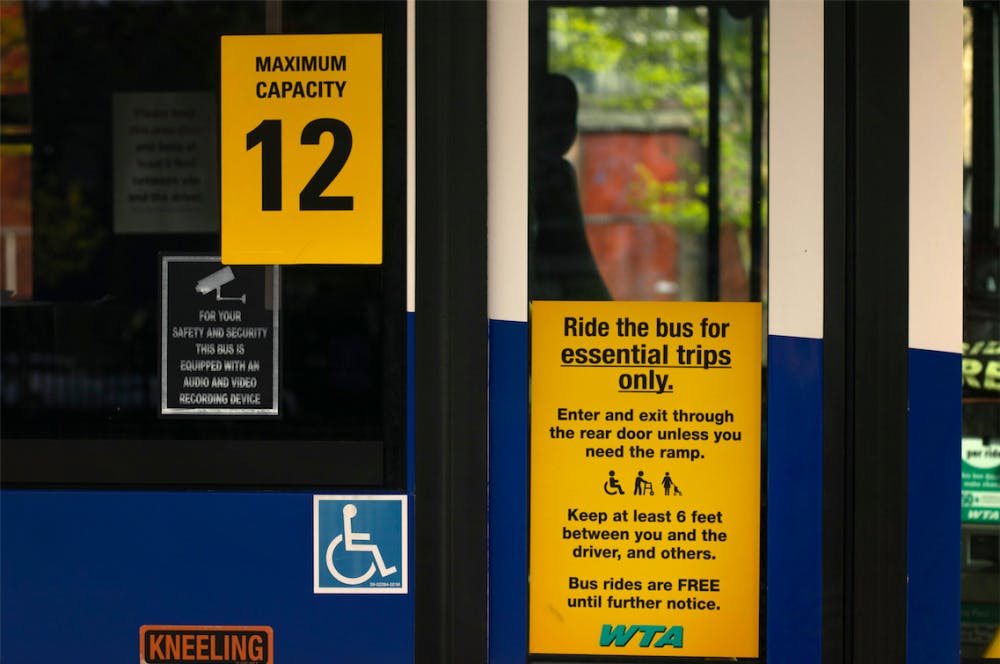
Increased social distancing and prevention measures are the focus of WTA’s new policies
As COVID-19 continues to spread, the Whatcom Transportation Authority (WTA) is introducing new policies to keep riders and drivers safe during their essential trips.
Reduced bus service, free bus fare and increased cleaning are some of the main methods WTA is using to slow the spread of COVID-19. The agency is focused on protecting riders and drivers’ health while still providing an essential service to the community.
Maureen McCarthy, the WTA public information officer, said that while many of these policies are new, they are largely based on measures the agency took during the H1N1 outbreak.
Bus service has been reduced, with buses now operating on the regular Saturday schedule Monday-Friday and on the regular Sunday schedule for Saturday-Sunday.
Popular routes, such as the 331 and 232 that run from Cordata/WCC to the downtown station, have had buses added. The increase was made to ensure WTA can serve all riders while maintaining the 12-15 person limit per bus.
“It’s actually a good thing our ridership is down by about 85% because on most routes the [rider] limit isn’t an issue,” McCarthy said.
Richard Higgs has been using the bus regularly during the pandemic to get to and from the grocery store once a week. He wears a face mask during his rides and has appreciated the precautions WTA has taken to enforce social distancing.
“Right now, the less people on the bus the better,” Higgs said.
Even with the reduction in ridership, McCarthy emphasized that people should only be riding the bus for essential trips.
“We pretty much mean, getting groceries, getting medicine or going to your job in an essential service,” McCarthy said.
On March 18, WTA removed all bus fares to promote social distancing between riders and drivers. Now riders who don’t require a ramp to board the bus are being asked to enter and exit through the rear doors.
McCarthy said WTA took “a small hit” when they temporarily eliminated fares, but the agency receives most of its funding from sales tax which, for now, has not been largely affected. Although McCarthy predicts that with so many businesses closed right now, they will see a decline in sales tax in the coming months.
WTA has also taped off bus seats closest to drivers and seats throughout the bus to promote social distancing among riders and retain the passenger limit.
All WTA bus drivers now have the option of wearing WTA-provided N-95 masks when on duty. These masks were supplied by Whatcom Unified, a local task force established to survey and distribute essential resources to local agencies and businesses.
On April 3, the CDC began recommending that people in the United States wear face masks in public. McCarthy said passengers are not required to wear masks, but WTA “highly recommends” wearing one if you are riding the bus.
Using her observations and input from drivers, McCarthy estimated that about half of WTA riders have begun using masks.
Additionally, WTA buses are now sanitized nightly by a designated cleaning crew. High-touch areas such as the farebox, seat bars, grip-bars, and pull cords are given extra sanitizing measures. Drivers can also sanitize buses throughout the day at their discretion.
Free bus Wi-Fi, which was introduced in May 2019, has been removed from all buses until further notice. McCarthy explained that WTA saw removing Wi-Fi as a way to encourage riders to only use the bus for essential travel.
“It’s so painful because a lot of these policies run counter to what we usually do. We’re not trying to limit rides, we’re not trying to make them less useful, we’re not trying to take away services,” McCarthy said.
At the moment, there is no set date for when any of these changes will be reversed.
WTA’s paratransit service, which provides direct transportation to individuals whose disability prevents them from using the route bus system, has changed during COVID-19. The smaller size of paratransit buses means that only two passengers can ride at once to maintain social distance.
Paratransit riders now also have the option of getting food bank deliveries brought right to their door by WTA.
McCarthy said that while the community response has been largely supportive, there are still some who believe the bus system should be shut down to prevent possible COVID-19 transmission.
In response, McCarthy emphasized that public transportation is an essential service to many people in the community, some of whom are working in grocery stores or hospitals.
While physical safety has been the focus of the WTA COVID-19 policies, emergency management experts are urging essential services to also prioritize policies that benefit mental health.
The National Academy of Sciences 2014 “Guide for Public Transportation and Pandemic Planning and Response” highlights mental health as a key part of a pandemic plan.
Paul Penn, a major contributor to the guide, emphasized that during a pandemic, “people are feeling powerless or frightened,” and they need “good information that allows them to have a sense of control over their lives.”
He highlighted social media as an effective channel for essential services to communicate consistently and clearly with the public.
For the long-term, emergency management experts, like Penn, are urging essential services, like transit agencies, to include prevention and recuperation measures in their pandemic plans. “A good emergency plan will look down the road and focus on recovery,” Penn said. He cautioned transit agencies from returning to normal too quickly or making rash cuts to service.
For now, “We [WTA] are planning for a deeper service cut if necessary. But we would only do that if the availability of staff or supplies looked like it wasn’t going to be sustainable,” McCarthy said.
For continual updates on WTA service and policies during COVID-19, visit their website or Twitter feed.





